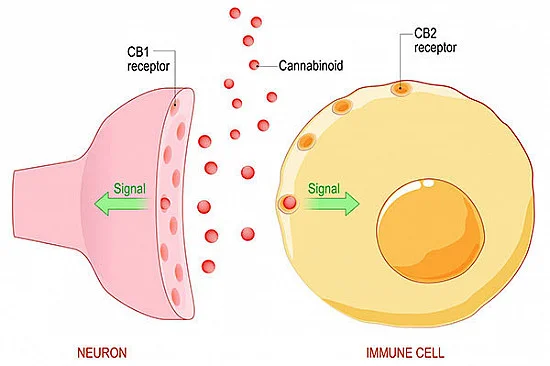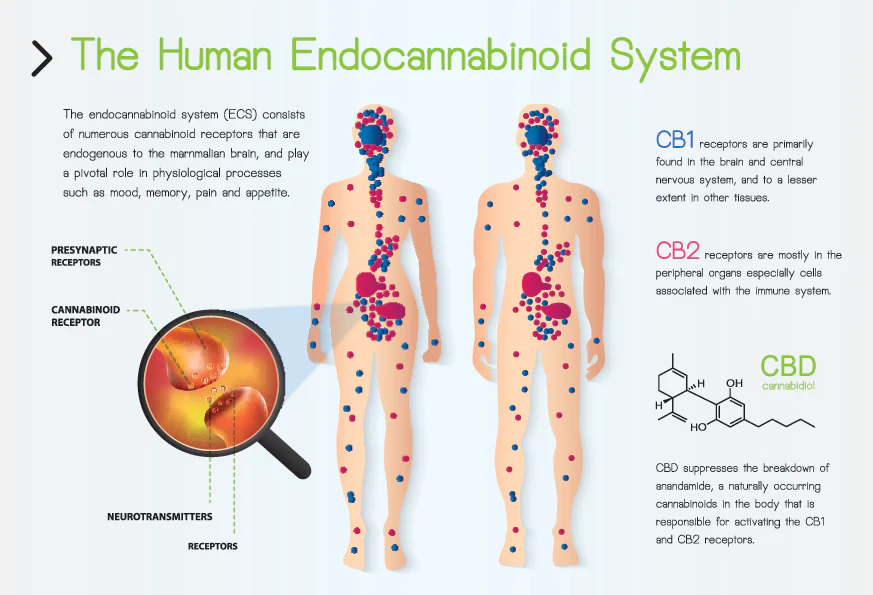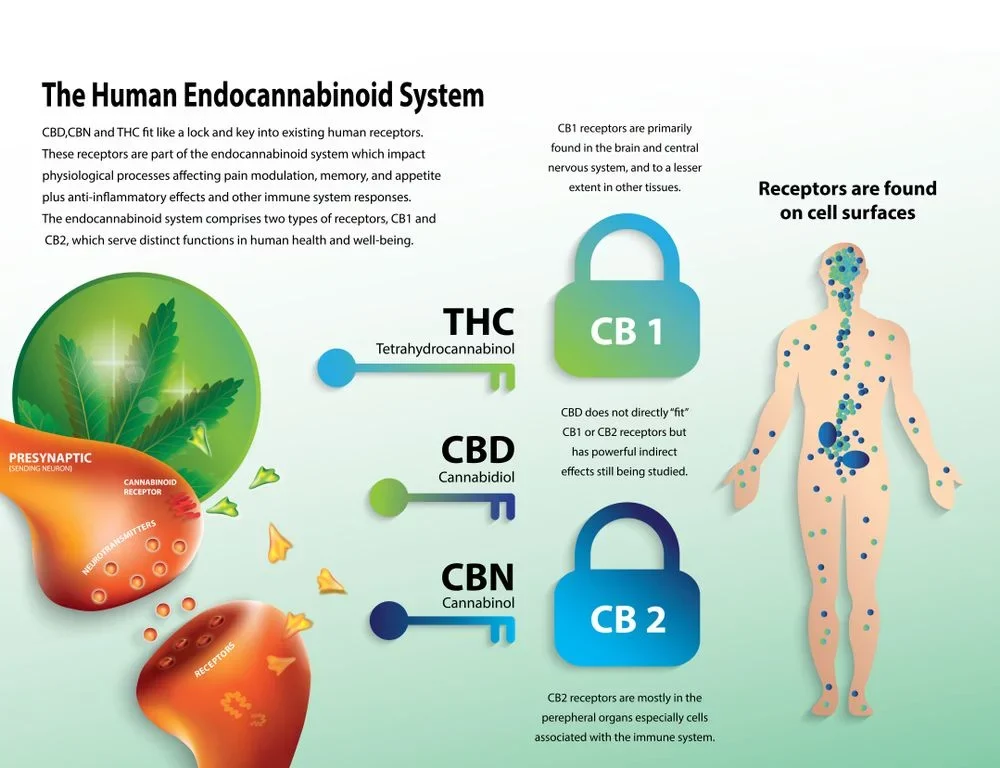The ever-evolving landscape of the Canadian cannabis scene places a central focus on a crucial element – the Endocannabinoid System (ECS). In essence, the ECS is a complex network that includes receptors, endocannabinoids, and enzymes, intricately maintaining balance within the body. Understanding the intricacies of the ECS becomes particularly crucial in the realm of cannabis consumption, where its intricate interplay with the plant’s cannabinoids takes center stage. This direct interaction, primarily facilitated by cannabinoids like THC and CBD, has profound effects on a range of biological functions, highlighting the extensive implications of the ECS.
Exploring the depths of the ECS reveals a multifaceted impact that resonates through key aspects of physiological well-being. Its influence on brain receptors, regulatory roles in functions such as eating and metabolism, and intricate involvement in areas like anxiety, memory, learning, and reproduction underscore its utmost importance. Against this backdrop, the aim of this article is to provide a comprehensive guide to the ECS, serving as an enlightening resource for individuals navigating the Canadian cannabis market. By shedding light on the profound interplay between the ECS and cannabis, we strive to empower readers with insights into how this symbiotic relationship shapes various aspects of health and wellness within the Canadian context.
Endocannabinoid System Basics
Embarking on an exploration of the fundamental elements of the Endocannabinoid System (ECS) unveils a captivating and intricate orchestration within the human body. The ECS functions as a regulatory network, consisting of three key components: endocannabinoids, receptors, and enzymes. Endocannabinoids, like anandamide and 2-arachidonoylglycerol (2-AG), serve as signalling molecules that bind to cannabinoid receptors, triggering a series of responses. These receptors, particularly CB1 and CB2, are distributed throughout the body, with CB1 predominantly located in the central nervous system and CB2 more prevalent in peripheral tissues and immune cells.
Enzymes within the ECS, such as fatty acid amide hydrolase (FAAH) and monoacylglycerol lipase (MAGL), play a crucial role in synthesizing and degrading endocannabinoids, tightly regulating their levels. The dynamic interplay between endocannabinoids binding to receptors and enzymes modulating their concentrations highlights the ECS’s pivotal role in maintaining homeostasis, or internal balance, within the body.
The homeostatic function of the ECS spans a range of physiological processes, including mood, sleep, appetite, immune response, and more. It serves as a harmonizing force, adapting to internal and external stimuli to ensure optimal functioning. A comprehensive understanding of these foundational aspects of the ECS lays the groundwork for a deeper comprehension of how cannabis, with its phytocannabinoids mimicking endocannabinoids, can influence this intricate system and contribute to overall well-being.
The ECS and Brain Receptors

Delving into the intricate world of the Endocannabinoid System (ECS) unveils a fascinating story of communication primarily facilitated through two key receptors: CB1 and CB2. CB1 receptors are predominantly found in the central nervous system, particularly in the brain, while CB2 receptors are more dispersed throughout peripheral tissues and immune cells. These receptors serve as crucial gatekeepers, receiving signals from endocannabinoids and phytocannabinoids alike.
The connection between the ECS, brain receptors, and the nervous system is a tightly woven tapestry that regulates various physiological processes. CB1 receptors, abundant in areas associated with cognitive functions, play a pivotal role in modulating neurotransmitter release, impacting phenomena such as mood, memory, and pain perception. On the other hand, CB2 receptors, more prevalent in the immune system, influence inflammation and immune responses.
In the Canadian context, the impact of cannabis on CB1 and CB2 receptors holds particular significance due to the country’s evolving cannabis landscape. With the legalization of cannabis, individuals have gained increased access to a variety of cannabis products, each carrying distinct ratios of cannabinoids. The interplay between these cannabinoids, particularly THC and CBD, with CB1 and CB2 receptors, influences the psychoactive and therapeutic effects of cannabis. Understanding this interplay is essential for consumers navigating the Canadian cannabis market, as it allows for informed choices based on the desired outcomes, whether recreational or medicinal, in alignment with the unique properties of different cannabis strains and products available.
Biological Functions Regulated by the ECS
The Endocannabinoid System (ECS) quietly exerts its regulatory influence over a range of vital biological functions, serving as a behind-the-scenes orchestrator. The ECS’s profound impact on diverse bodily functions includes the regulation of mood, immune response, sleep patterns, and more. One crucial area where the ECS assumes a pivotal role is in modulating eating habits. The intricate interplay between endocannabinoids and receptors, particularly CB1, has been associated with regulating appetite and the rewarding aspects of food consumption. This connection underscores the ECS’s involvement not only in maintaining physiological balance but also in shaping behaviours related to nutrition.
In Canada, research has made significant progress in unraveling the complex relationship between the ECS and various biological functions. With the ongoing legalization of cannabis in Canada, there has been a surge in scientific exploration to understand how cannabinoids interact with the ECS and impact health. Studies have delved into the specific intricacies of ECS modulation in the Canadian population, shedding light on potential therapeutic applications for conditions related to appetite dysregulation, particularly those associated with certain medical treatments. This evolving field of research emphasizes the importance of staying informed about scientific developments, especially for individuals navigating the Canadian cannabis market, as it opens up new possibilities for utilizing cannabis as a tool to promote holistic well-being.
The ECS and Mental Health
The intricate relationship between the Endocannabinoid System (ECS) and mental health represents a significant frontier in cannabis research, particularly in the Canadian context. Exploring the link between ECS and anxiety reveals a nuanced interplay wherein endocannabinoids, when in balance, may contribute to stress resilience. CB1 receptors, abundant in areas of the brain associated with emotional processing, play a key role in modulating anxiety responses. Understanding this dynamic can offer insights into how cannabis, with its potential to influence the ECS, may impact anxiety-related conditions.
The ECS’s role in memory and learning processes adds another layer to its influence on mental health. CB1 receptors are prevalent in brain regions responsible for memory formation and cognitive functions. The modulation of neurotransmitter release by the ECS suggests its involvement in shaping memory consolidation and learning experiences. This intricate dance within the ECS underscores its potential impact on cognitive functions, a factor of paramount importance in mental well-being.
Canadian studies have been pivotal in advancing our understanding of cannabis and mental health within the framework of the ECS. With the legalization of cannabis, there has been a surge in research examining the therapeutic potential and potential risks associated with cannabis use, particularly concerning mental health outcomes. These studies delve into how cannabinoids, by interacting with the ECS, may influence conditions such as anxiety disorders, post-traumatic stress disorder (PTSD), and depression. Navigating the Canadian cannabis landscape necessitates a nuanced understanding of these findings, allowing individuals to make informed choices based on their mental health needs while considering the complexities of the ECS modulation.
Metabolism and Reproduction Functions

Within the intricate web of the Endocannabinoid System (ECS), its influence extends to two critical aspects of human physiology: metabolism and reproduction. The ECS plays a pivotal role in regulating metabolism, acting as a fine-tuner in the intricate balance of energy homeostasis. This regulatory function is particularly evident in the ECS’s impact on appetite, nutrient utilization, and energy storage, with CB1 receptors, abundantly present in the central nervous system, influencing these processes. Understanding the ECS’s role in metabolism is key for those navigating the Canadian cannabis market, as different strains and cannabinoid profiles may have varying effects on appetite and overall metabolic health.
In addition to metabolism, the ECS intricately influences reproductive functions. The presence of ECS components in the reproductive organs and the modulation of endocannabinoids during different stages of the reproductive process highlight the system’s role in fertility and pregnancy. This dual role of the ECS in both metabolism and reproduction underscores its pervasive impact on fundamental aspects of human biology.
In the Canadian cannabis market, the relevance of the ECS concerning metabolism and reproduction is substantial. As individuals explore cannabis for various reasons, including wellness and recreation, understanding how different cannabinoids interact with the ECS becomes paramount. This awareness empowers consumers to make informed choices aligned with their health goals. Moreover, as research in Canada continues to unfold, elucidating the intricate links between the ECS, cannabis, metabolism, and reproduction, individuals can anticipate an evolving landscape where tailored cannabis products may address specific needs related to these physiological processes.
Practical Tips for Consumers
For cannabis consumers in Canada, optimizing the benefits of cannabis while ensuring a balanced Endocannabinoid System (ECS) requires a nuanced approach. Understanding the optimal use of cannabis for ECS balance involves recognizing the unique interplay between cannabinoids, particularly THC and CBD, and individual physiological responses. Striking a balance that aligns with personal wellness goals and preferences is crucial. Dos and don’ts for maintaining a healthy ECS involve mindful consumption, recognizing the importance of moderation, and being cognizant of individual tolerance levels. It’s essential to avoid excessive or imbalanced cannabis use, as this can potentially disrupt the delicate equilibrium within the ECS.
In the diverse landscape of the Canadian cannabis market, consumers have access to an array of products tailored to address specific ECS needs. From CBD-dominant products for those seeking non-psychoactive relief to balanced THC:CBD ratios catering to a more holistic experience, the market caters to a variety of preferences. Education plays a pivotal role in helping consumers navigate this expansive market, empowering them to make informed decisions about product selection, consumption methods, and dosage. As regulations evolve and scientific understanding deepens, the Canadian cannabis market is poised to offer increasingly specialized products, providing consumers with more options to tailor their cannabis experience in alignment with ECS health.
Individualized Approaches to ECS Optimization
As we delve into the intricacies of the Endocannabinoid System (ECS), it becomes evident that individual responsiveness to its modulation varies significantly. Exploring these variations in ECS responsiveness among individuals reveals a personalized dimension to cannabis consumption. The ECS, influenced by genetics, lifestyle, and environmental factors, manifests differently in each person, impacting how they respond to cannabinoids. Tailoring cannabis consumption based on personal ECS profiles acknowledges this diversity, emphasizing the need for a nuanced approach to optimize individual well-being.
Understanding one’s unique ECS responsiveness enables consumers in Canada to make informed choices about the type, concentration, and method of cannabis consumption that aligns with their specific physiological makeup. This individualized approach not only enhances the potential therapeutic benefits of cannabis but also contributes to a more satisfying and personalized cannabis experience, reflecting the diverse needs and preferences within the Canadian population. As the Canadian cannabis market continues to evolve, the potential for personalized cannabis experiences is increasingly recognized, offering consumers the opportunity to navigate and enjoy the benefits of cannabis in a way that resonates uniquely with their own ECS characteristics.
Challenges and Controversies
Despite the burgeoning interest and advancements in the understanding of the Endocannabinoid System (ECS), challenges and controversies persist, shaping the discourse around its role in cannabis consumption. Common misconceptions about the ECS often stem from a lack of awareness and can lead to misinformation. One such misconception is oversimplifying the ECS’s functions, overlooking its intricate interplay in maintaining homeostasis across various bodily systems. Clearing these misconceptions is crucial for fostering a more accurate understanding of the ECS and its implications.
Controversies surrounding the ECS and cannabis further contribute to the nuanced landscape. Debates often revolve around the therapeutic potential versus potential risks associated with cannabis use, especially concerning mental health. Questions about the long-term effects of cannabis on the ECS and its role in certain medical conditions continue to fuel discussions within the scientific and medical communities. Addressing these controversies requires ongoing research and open dialogue to navigate the complexities and provide evidence-based insights.
In the Canadian context, legal aspects add an additional layer of complexity to ECS-related cannabis consumption. With the legalization of recreational cannabis, regulations continue to evolve, impacting the accessibility and usage of cannabis products. Understanding the legal framework surrounding the ECS and cannabis is vital for consumers, ensuring compliance with Canadian laws. As policies adapt, staying informed about legal implications becomes paramount for individuals seeking to integrate cannabis into their wellness routines, contributing to a more responsible and legally compliant cannabis landscape in Canada.
The Future of ECS Research

The prospective trajectory of Endocannabinoid System (ECS) research in Canada holds significant promise, with scientists delving into emerging trends and studies that continually reveal the complexities of this intricate physiological system. Increasing attention is directed towards unraveling novel facets of the ECS, investigating its involvement in specific health conditions, and comprehending potential therapeutic applications of cannabinoids. The advent of state-of-the-art technologies and methodologies is enabling a more profound exploration of the ECS, providing precise insights into its functions and interactions.
The potential influence of ECS knowledge on the Canadian cannabis industry is considerable. As research elucidates the intricacies of cannabinoid interactions with the ECS, the industry can anticipate the development of more targeted and personalized cannabis products. This shift towards precision in product development has the potential to revolutionize the therapeutic landscape, presenting consumers with tailored solutions for their unique health and wellness needs. The Canadian cannabis market might undergo a transformation with the integration of ECS-centric insights, fostering the creation of innovative products that cater to diverse consumer preferences and health objectives.
Promoting further exploration and advancements in understanding the ECS is crucial for sustained growth and development. By endorsing and facilitating ongoing research initiatives, stakeholders in Canada can contribute to a comprehensive grasp of the ECS’s role in human health. This encouragement supports the generation of valuable knowledge that not only informs medical practices but also shapes responsible cannabis use. As the scientific community and the cannabis industry collaboratively push the boundaries of ECS research, Canadians can anticipate a future where cannabis products are not only legalized but optimized for the promotion of holistic well-being, grounded in a deep understanding of the ECS and its intricate functions.
Conclusion
In conclusion, our examination of the Endocannabinoid System (ECS) has emphasized its crucial importance in the realm of cannabis consumption for individuals in Canada. Serving as a intricate network comprised of receptors, endocannabinoids, and enzymes, the ECS plays a pivotal role in preserving equilibrium within the body, impacting diverse biological functions and mental processes. From its influence on brain receptors, regulation of physiological functions, and participation in mental well-being to its involvement in metabolism and reproduction, the ECS stands as a dynamic system interwoven with various aspects of human physiology.
Advocating for ongoing education and research in this field holds significance for both consumers and industry stakeholders. As the Canadian cannabis landscape undergoes transformations, staying informed about emerging trends and scientific revelations related to the ECS ensures that individuals can make well-informed choices regarding their cannabis consumption. This continuous research not only deepens our comprehension of the ECS but also contributes to the creation of safer and more effective cannabis products tailored to individual health requirements.
Emphasizing the importance of a well-balanced ECS for overall well-being becomes a central principle. With cannabis legalization, individuals now have unprecedented access to a variety of products, each with its distinct cannabinoid profile. Striving for a balanced ECS through mindful cannabis use aligns with the objective of promoting holistic wellness. As consumers navigate the expanding array of cannabis options in Canada, maintaining a nuanced understanding of the ECS and its complex interaction with cannabinoids remains essential for unlocking the potential benefits of cannabis for individual health and well-being.








